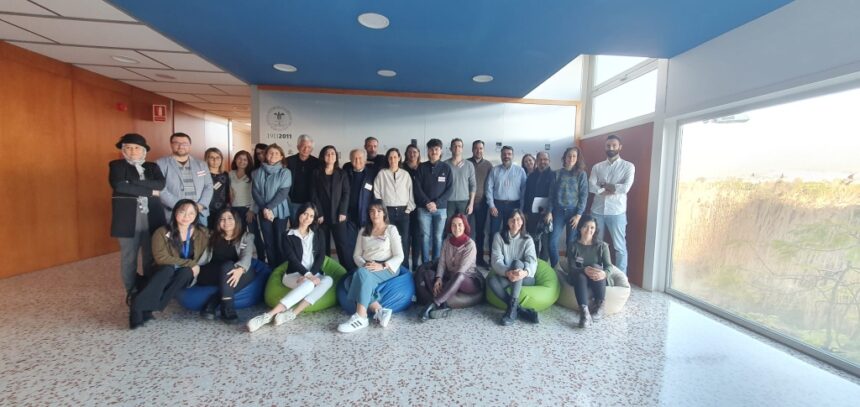The Third General Assembly of the SWITCHtoHEALTHY project was held in Castelldefels (Barcelona, Spain) on 24-25 January 2024 and was hosted by CREDA (Centre for Agro-Food Economics and Development). The meeting provided an opportunity for all project partners to come together and share updates on the progress made to date, as well as to discuss the upcoming actions.
Empowering healthy eating based on Med diet
SWITCHtoHEALTHY aims to promote healthy eating habits based on the Mediterranean food models, also among children and adolescents, through three different action levels: the development of digital tools, new hands-on educational materials, and the design of healthy snacks developed through co-creation groups. Hundreds of families in three Med countries (Spain, Turkey, Marocco) will participate in a multi-component intervention study and will be asked to use the tools and products developed during the project, to evaluate impact on adherence to the Mediterranean diet. This report outlines the key highlights from the latest meeting in Barcelona.
Consumer-Centric Approach
SWITCHtoHEALTHY places significant emphasis on consumers behaviours (consumer science) and active consumers involvement (the new snack prototypes are created through collaborative co-creation focus groups). As part of the Work Package 1 (“Consumer science and co-creation”), an observational cross-sectional study was conducted through a survey administered to more than 800 participants with face-to-face or online interviews. The surveys were carried out in 4 countries (Turkey, Italy, Spain, Lebanon) and were able to trace general nutritional and lifestyle habits. Primary barriers to adopting the Mediterranean diet include the perceived high cost of Mediterranean foods, limited restaurant options, and the complexity of meal preparation consistent with its principles. The newly created snacks were presented to the selected focus groups and were analysed for their validation and ranking.
Innovative Food Prototypes
As part of Work Package 2, “Food eco-design and product development”, 24 food prototypes were successfully developed in collaboration with food companies and supportive Research and Technology Organizations (RTOs) and a Report on the laboratory prototypes was produced together with a ranked list. A preliminary selection of 8 prototypes – based on focus groups’ preferences as well as nutritional considerations – was made. In the following months the selected prototypes obtained at laboratory scale will be produced in pre-industrial facilities to validate/improve the product characteristics (preindustrial scale-up). The novel snacks, ranging from fruit and vegetable blend smoothies to cereal and nut bars, are crafted from locally sourced Mediterranean ingredients.
Digital Solutions for Health
Additionally, the project has produced two mobile applications and an educational game under Work Package 3, “Digital and Educational Tools”. The Artificial Intelligence based App for weekly meals consistent with Med diet has been disseminated to the selected focus groups. The dietary plans proposed by the App not only provide the necessary nutrients based on the user’s profile, but also offer a variety of flavours and textures aimed at making healthy eating enjoyable. An App for helping parents to prepare balanced meals for their children considering what children eat at school has also been developed and new steps were taken for the improvement of the educational game for mobile devices. The preparation of educational hands-on materials has also started through co-creation sessions and the use of “world cafe methodology” with the groups involved. The activities designed for and by the adolescents will be later collected in a practical e-book.
Multicentric Nutritional Intervention and Impact Assessment
The multicentric nutritional intervention study – that is the core of SWITCHtoHEALHTY project, aiming at the evaluation of the overall effect of the multicomponent strategy implemented to promote a greater adherence to Med Diet – has started through families’ recruitment (Work Package 4 “Family-based interventions deployment”). In Spain, 80 families have already been recruited and have performed the first assessment visit (recruitment phase is set to start in Turkey). The Phase 2 of the intervention, during which the involved families will actively use the educational materials, digital tools, and snacks developed in Phase 1, is scheduled in September 2024 and will end in November 2024. Subsequently, Work Package 5 “Monitoring and understanding behavioural changes” will scrutinize behavioural, economic, and environmental shifts to evaluate the project’s impact.
Expanding Communication Channels
Regarding the communication activities (Work Package 6 “Creation of enabling environment”), it was announced that a Facebook account will soon be created to engage a broader audience including schools and healthcare professionals.
The fourth General Assembly has been scheduled between June and July 2024.


